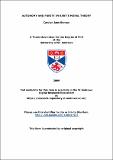Autonomy and purity in Kant's moral theory
Abstract
Kant believed that the moral law is a law that the rational will legislates. This thesis examines this claim and its broader implications for Kant’s moral theory.
Many are drawn to Kantian ethics because of its emphasis on the dignity and legislative authority of the rational being. The attractiveness of this emphasis on the special standing and capacities of the self grounds a recent tendency to interpret Kantian autonomy as a doctrine according to which individual agents create binding moral norms. Where this line is taken, however, its advocates face deep questions concerning the compatibility of autonomy and the conception of moral requirement to which Kant is also certainly committed – one which conceives of the moral law as a strictly universal and necessary imperative.
This thesis has two main aims. In the first half, I offer an interpretation of Kantian autonomy that both accommodates the universality and necessity of moral constraint and takes seriously the notion that the rational will is a legislator of moral law. As a means of developing and securing my preferred view, I argue that recent popular interpretations of Kantian autonomy fail to resolve the tensions that seem at first glance to plague the concept of self-legislation, where what is at stake is the legislation of a categorical imperative. In the second half of this thesis, I examine the connections between my preferred interpretation of self-legislation and Kant’s dichotomisation of reason and our sensuous nature. I argue that some of the more harsh and seemingly unreasonable aspects of Kant’s moral philosophy can be defended by bringing to light the ways in which they are connected to his commitment both to the autonomy of the will and to developing a genuinely normative ethics.
Type
Thesis, PhD Doctor of Philosophy
Collections
Items in the St Andrews Research Repository are protected by copyright, with all rights reserved, unless otherwise indicated.

